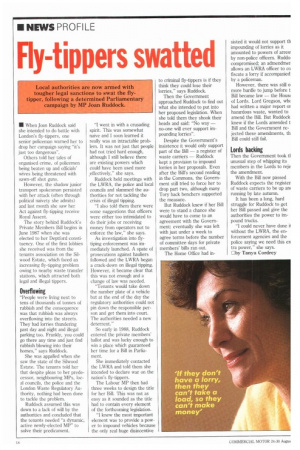Fly-tippers swatted
Page 20

If you've noticed an error in this article please click here to report it so we can fix it.
• When Joan Rudciock said she intended to do battle with London's fly-tippers, one senior policeman warned her to drop her campaign saying "it's just too dangerous".
Others told her tales of organised crime, of policemen being beaten up and officials' wives being threatened with sawn-off shot guns.
However, the shadow junior transport spokesman persisted with her attack (often through political naivety she admits) and last month she saw her Act against fly-tipping receive Royal Assent.
The story behind Ruddock's Private Members Bill begins in June 1987 when she was elected to her Deptford constituency. One of the first lobbies she received was from the tenants association on the Sitwood Estate, which faced an increasing fly-tipping problem owing to nearby waste transfer stations, which attracted both legal and illegal tippers.
"People were living next to tens of thousands of tonnes of rubbish and the consequence was that rubbish was always overflowing into the streets. They had lorries thundering past day and night and illegal parking too. Frankly, you could go there any time and just find rubbish blowing into their homes," says Ruddock.
She was appalled when she saw the state of the Silwood Estate. The tenants told her that despite pleas to her predecessor, neighbouring MPs, local councils, the police and the London Waste Regulatory Authority, nothing had been done to tackle the problem.
Ruddock assumed this was down to a lack of will by the authorities and concluded that the tenants needed "a dynamic, active newly-elected MP" to solve their predicament. "I went in with a crusading spirit. This was somewhat naive and I soon learned it really was an intractable problem. It was not just that people had not tried hard enough, although I still believe there are existing powers which could have been used more effectively," she says.
Ruddock held meetings with the LWRA, the police and local councils and slammed the authorities for not tackling the crisis of illegal tipping.
"I also told them there were some suggestions that officers were either too intimidated to do their jobs or receiving money from operators not to enforce the law," she says.
As investigation into flytiping enforcement was immediately launched. A spate of prosecutions against hauliers followed and the LWRA began a crack-down on illegal tipping. However, it became clear that this was not enough and a change of law was needed.
"Tenants would take down the number plate of a vehicle but at the end of the day the regulatory authorities could not pin down the responsible person and get them into court. The authorities needed a new deterrent."
So early in 1988, Ruddock entered the private members' ballot and was lucky enough to win a place which guaranteed her time for a Bill in Parliament.
She immediately contacted the LWRA and told them she intended to declare war on the nation's fly-tippers.
The Labour MP then had three weeks to design the title for her Bill. This was not as easy as it sounded as the title had to contain every element of the forthcoming legislation.
"I knew the most important element was to provide a power to impound vehicles because the only real huge disincentive to criminal fly-tippers is if they think they could lose their lorries," says Ruddock.
Then the Government approached Ruddock to find out what she intended to put into her proposed legislation. When she told them they shook their heads and said: "No way — no-one will ever support impounding lorries".
Despite the Government's insistence it would only support part of the Bill — a register of waste carriers — Ruddock kept a provision to impound lorries in her proposals. Even after the Bill's second reading in the Commons, the Government still tried to force her to drop part two, although many Tory back benchers supported the measure.
But Ruddock knew if her Bill were to stand a chance she would have to come to an agreement with the Government: eventually she was left with just under a week to agree terms before the number of committee days for private members' bills ran out.
The Home Office had in sisted it would not support th impounding of lorries as it amounted to powers of arresi by non-police officers. Rudd() compromised; an admendmer allows an LWRA officer to co fiscate a lorry if accompanied by a policeman.
However, there was still o more hurdle to jump before t Bill became law — the Hous( of Lords. Lord Gregson, whc had written a major report 01 hazardous waste, wanted to amend the Bill. But Ruddock knew if the Lords amended t Bill and the Government rejected these amendments, th Bill could still fail.
Then the Government took tl unusual step of whipping its members in the Lords to reje the amendment.
With the Bill now passed Ruddock expects the register of waste carriers to be up ani running by late autumn.
It has been a long, hard struggle for Ruddock to get her Bill passed and give the authorities the power to impound trucks.
"I could never have done ii without the LWRA, the enforcement agencies and the police saying we need this ex tra power," she says.
Oby Tanya Cordrey




































































































